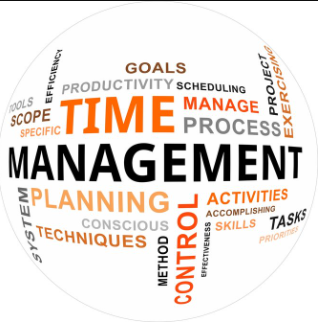Looking for a job can feel overwhelming. Yet, managing your time well can make it better. To be more productive, create a daily plan that includes job searching and personal activities. Set goals you can reach. This will help you search for jobs more effectively and find the right job faster.
Here are seven tips to manage your time better. They will help you make a plan, set goals, and see job hunting as your main job. By looking into companies and making unique resumes and interview plans, small changes can make a big difference in your job search.
Develop a Schedule
Getting a routine is key for those looking for a job. It helps use time well. A “time blocking” method lets you focus on one job at a time. This cuts down on getting sidetracked.
You plan out your day to cover all job search parts. This includes looking for jobs, networking, and improving skills. A good plan keeps you on track and productive.
Create a Daily Routine
A daily plan helps keep you organized and working hard. Starting with a to-do list each morning is a good idea. It makes you more productive.
Set aside time for job listings, fixing up your resume, and checking on your applications. Using job search sites and alerts saves time. It makes finding a job easier. Set daily goals that are SMART to keep focused.
Balance Job Search and Other Commitments
It’s key to balance job hunting with other parts of life. Set aside “flex hours” in your day for surprises. It’s also good to set limits to keep off distractions like emails and social media.
Take breaks and do things for yourself to avoid getting too stressed. This helps stop burnout. Choose tasks wisely for better job search results. Your efforts will be more successful and last longer.
Set Goals and Tasks
Setting clear goals helps a lot during your job search. Slour and found a report which says 43% of workers struggle to stay motivated. A good plan for your job search goals can solve this.
Having a set approach also makes it easier to focus. So, making a goal plan is key.
Importance of Goal Setting
Goal setting is crucial for a well-organized job search. It gives you visible goals that are simple to follow. For example, applying to a set number of jobs each day can bring structure to your search.
A 2016 study by Roster showed that mess affects your well-being. This highlights the need for good task management.
Daily, Weekly, and Monthly Goals
It’s good to break down goals into smaller tasks. The Eisenhower Matrix helps sort tasks by importance. This is great for staying focused and knowing what to work on first.
Using Parkinson’s law can make you more productive. It says that tasks grow with the time you have for them. By setting time limits, you can do more, faster.
Time Management for Job Seekers

Managing your time well is key when looking for a job. It helps you use your job search time wisely. It also keeps you from getting too tired. People without jobs might search for 30 hours or more each week. Those who work already might only search for 5 to 10 hours a week. So, it’s important to look for jobs in smart ways. Success often comes through networking, career fairs, talking with recruiters, and doing your research.
To be more productive, keep your work area tidy. Choose specific times to check your emails. This keeps you from getting stuck on small things. Also, focus your job search on employers that truly fit you. This saves a lot of time.
Try the Pomodoro Technique for better focus. It mixes work time with short breaks. This keeps you productive and less stressed. Taking breaks is also good for feeling calm and thinking clearly.
Americans over 15 watch TV for about 2.9 hours a day. Using free time wisely is important. Balance your job search with personal time. Setting goals for work and life helps manage your time better. Successful people make the most of their time by being organized. They might even wake up an hour early to make their day better.
Including downtime in your schedule is important for your mind. There are tools and tips to help set and reach your goals.
If you can, let others help with some tasks. This gives you more time. Make sure to care for yourself with exercise and eating well. This keeps you healthy during your job search.
Time management in job searching means doing things in an organized way. It helps keep you going and reach your career desires.
Apply During a Set Time Period Each Day
Having a set routine for job applications is key. It makes sure you stay organized. Set aside time each day for this to keep it from clashing with other tasks. This way, you can look for jobs without messing up your other plans.
The Benefits of a Structured Schedule
Planning your job hunt brings many good points. It keeps you going, which is essential to stay on track. Many jobs get filled in the first 30 days, so being quick matters. Having a fixed time to apply can up your chances of finding a job. Plus, it helps you set clear goals and manage your day.
Tips for Maintaining Consistency
Staying consistent is crucial for your job search. Break big tasks into smaller ones to keep from getting swamped. Use plans and calendars to keep track of what you’ve done. Remember to take breaks to avoid getting too tired. Setting specific hours for job hunting helps manage your time well. It makes sure job searching fits into your day without issues.
Treat Your Search Like a Job
Treat looking for a job as if it was your full-time job. This can make your search results much better. By doing things like experts, you stay organized and efficient. This leads to finding a job faster.
Create a Dedicated Workspace
Having a special spot for job searching helps a lot. It keeps you focused and away from distractions. Make sure this space has everything you need to work well.
Set Specific Job Hunting Hours
It’s important to have set hours for looking for a job. Experts say to spend 20-30 hours a week at first. This helps you work on important stuff like networking, without getting too tired.
Too much job searching can make people feel burned out. Around 55% of job hunters in the US feel this way. By choosing certain hours for job hunting and resting, you won’t get too stressed.
Research Companies Before You Apply
Doing your homework on companies is key to finding a great job. Studies show we spend 90,000 hours at work in a lifetime. That’s why it’s important to find a place that fits our goals and values.
Looking into a company’s past, what they sell, and their mission helps you understand their culture. Knowing this lets you see if you match up with their values. This makes your job application stronger. Websites like employer research are very useful for this.
Asking smart questions in interviews shows you’re serious about the job. It also shows you’ve done your research. Getting opinions from people who have worked there, like through Glassdoor, is a good idea too. This helps you see if you’d like the company’s culture.
Nowadays, it’s all about being seen online. Keep your LinkedIn up to date with your latest skills. Networking is super important. Go to events, join groups online, and talk to people in your industry. This helps make your job hunt better.
Research proves that knowing about a company makes you more at ease in interviews. You apply for jobs in a smarter way. This increases your chances of finding a good job.
Create Resume and Interview Templates
Creating templates for resumes and interview answers makes applying for jobs easier. Making your resume fit each job helps a lot. Recruiters suggest focusing on your latest jobs with a few bullet points each.
It’s also key to show what makes you stand out, like awards. For people new to the job world, share your volunteer work and clubs. In the U.S. and Canada, don’t put your photo on your resume. Keep your LinkedIn updated instead.
Getting ready for interviews? Use templates for common questions. This lets you adjust your answers and show off your skills better. Companies love to see good time management. Show this skill in different parts of your resume.
To efficiently find a job, plan well. Your papers should show you’re ready to work. Adding time management to your daily life helps in many ways. It makes your applications better and preps you for future tasks.
Know When to Take Breaks
Taking breaks during a job search is key to avoid getting tired. Short breaks help you refocus and stay productive. This keeps your job hunt strong and steady.
The Power of Short Breaks
Working for about 75 to 90 minutes, then resting for 15 minutes is good. This helps keep your focus sharp. Adding breaks makes you feel fresh, stress-free, and balanced.
Plan your day with breaks in mind to better manage your time. Moving around or stretching during these breaks boosts refreshment. It keeps you going strong.
Avoiding Job Search Burnout
If you start to feel overwhelmed, take a quick break. It’s important to unplug and rest both your mind and body. Doing something fun or eating healthy snacks can keep your energy up.
Meditation can also help clear your mind and lower stress. This makes your job hunting more effective and less tiring.
Conclusion
To make your job search better, use these time management tips. Keeping a tight schedule and clear goals helps a lot. Spend 30 minutes a day looking for jobs to keep going without getting swamped.
Try tools like WeekPlan for tasks, Calendly for meetings, and Forest for staying focused. Using the Pomodoro technique is great for productivity. It mixes work with short breaks.
Think about how you handle your time. It’s key to cut down on distractions. Have a special place to work, turn off unnecessary alerts, and only check emails or social media at certain times. Grouping tasks saves time and boosts productivity, helping you find a job faster.
Set personal goals, like applying to three jobs a week. This keeps you moving and lets you celebrate wins. This keeps you excited about your job hunt. By following these tips, you’ll give your job search a new life and find better chances.
FAQ
What are some effective time management tips for job seekers?
Using job hunting methods and keeping a strict daily plan are essential. Make a plan for each day. Set achievable goals, and take breaks to boost productivity in your job search.
How can I develop a schedule for my job search?
Set aside specific times for job search tasks like applying and networking. It’s vital to keep a steady routine. Balance your job search with other daily activities.
What is the importance of goal setting during a job search?
Goals keep your job search on track. They can be set for the day, week, or month. They give clear steps to take and keep you accountable.
How do I manage my time during a job search?
Use a strict schedule, set real goals, and focus on career goals. Add breaks often to avoid getting too tired.
Why should I apply for jobs during a set time period each day?
Having a regular job search routine helps you keep on track. It avoids disrupting your current job. It also keeps the momentum going.
How do I treat my job search like a job?
Make a workspace just for job hunting, and choose hours to work on it. Acting professionally makes your search better.
Why is it important to research companies before applying?
Research helps you apply to jobs that match your skills and beliefs. This way, your applications are more on point and work better.
How can creating resume and interview templates help in my job search?
Templates for resumes and interviews save time. They let you quickly change things to fit different jobs, making your search faster.
When should I take breaks during my job search?
Knowing when to rest is key to avoid feeling too tired. Breaks refresh your mind and make your job hunt more successful.

More Posts
Never Split the Difference: Lessons to Avoid Procrastination
Procrastination is a big problem that affects both small and big decisions in life. Writing about how to beat procrastination shows how common it is. It's a mix of feeling unmotivated and insecure,...
10 Tips to Optimize Your Monthly Reset Routine in 2024
Efficiently closing out each month with a structured monthly refresh can significantly enhance your overall productivity boost and well-being. As we step into 2024, establishing a well-thought-out reset routine becomes indispensable for ongoing life optimization. Reflecting...
The best OKR Templates for Everyone
Creating OKRs can be tricky for new companies that are not used to it. Most of them are struggling to design the ideal OKRs for their business and preparing for the consequences of...
Tips to Overcome Procrastination
It’s really usual to feel lazy in all parts of our lives, regardless of whether that implies scrambling to complete a work undertaking or putting off going to the exercise center, or doing...



